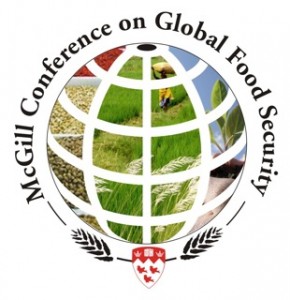An impressive array of international experts got down to work at McGill yesterday to tackle the global food crisis.
The conference on Global Food Security, which began Wednesday night with a pair of lectures at Centre Mont-Royal, continues today at the New Residence building on Park Ave. One of the first of its kind in the world, the conference has drawn representatives from agriculture, government and non-government organizations, the food industry and academics whose research has already led to important changes in the way we grow crops and how we can protect the environment.
In addition to trying to reach agreement on some substantive suggestions for attacking the problems that have led to the crisis, the conference will demonstrate the overwhelming need for continued investment in agricultural research and development.
Co-chaired by former Canadian Prime Minister, the Rt.-Hon. Joe Clark, of McGill’s Centre for Developing Area Studies, and by McGill Chancellor Richard Pound, the conference will cover
six areas.
Voices from the Field: Speakers will address specific experiences in eight different parts of the world, including Haiti, India, Ethiopia, Morocco, Uzbekistan, China and West Africa.
The World Food Situation: It is estimated that food stocks are at their lowest levels in 30 years. This has led to sharply higher prices and, in turn, political, social and economic instability, not to mention hunger and malnutrition. Speakers will present information and data on the current supply of food in the world and the level of demand.
Underlying Factors: There are many different causes for the crisis, including the rise of biofuels, commodity prices, climate change, market speculation and changing patterns of food consumption.
The International Response: Representatives from international agencies will speak on how their organizations have responded to the crisis, what solutions they have found so far and what their strategies are for helping curb the crisis in the future.
Getting Food to the People – Success Stories: The situation is not all bleak. Some groups have been able to help communities in need and to meet food demands. Speakers will share their experiences and offer insight into what lessons can be learned from the
success stories.
The Way Forward – Elements of a Framework for Managing the Crisis: Taking key points from each session, participants will build a Framework for Canadian Action, identifying a way forward for managing the global food crisis in the longer term.
“I have been overwhelmed by the broad international response to this conference,” said Chandra Madramootoo, Dean of Agricultural and Environmental Sciences. “The number of people and organizations at a very high level who decided to participate in this event, was astonishing. We have top people from all the key organizations around the world coming together with people from industry and agriculture and the university to discuss ways to cope with this urgent problem. The fact that so many have come from so far, and on relatively short notice, suggests just how serious the problem is and how eager organizations are to get together to try to cope with it.”
For information on the conference speakers, the program and media registration, please visit www.mcgill.ca/globalfoodsecurity.

